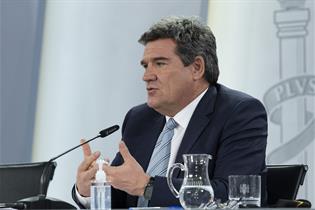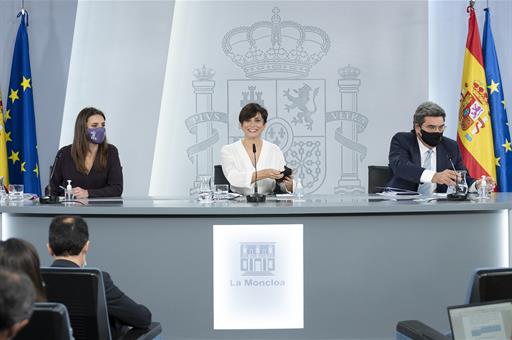Council of Ministers
The Government of Spain boosts occupational pension plans
Council of Ministers - 2021.11.23
Moncloa Palace, Madrid
The Council of Ministers has analysed the preliminary draft of the Law regulating occupational pension plans, which responds to the recommendations of the Toledo Pact and is included in the Recovery, Transformation and Resilience Plan and the General State Budget for 2021.
The Minister for Inclusion, Social Security and Migration, José Luis Escrivá, explained that the promotion of occupational plans is part of the modernisation and reinforcement of the pension system. The first pillar, he said, is to ensure their revaluation and maintain their purchasing power indefinitely and in accordance with the Consumer Price Index (CPI). The second pillar includes a set of measures aimed at relieving the social security system of 20 billion euros of inappropriate expenditure.
Escrivá explained that the future law will facilitate access to collective pension plans for salaried employees, the self-employed and public employees who, until now, have not had access to the product because it has been aimed at large companies. The minister pointed out that the current pension fund offering is mainly aimed at individual plans, which revolve around the banking system, with high fees and designed for high incomes. The regulation incorporates different instruments to set up a cheap savings product, aimed at enabling citizens to supplement their pensions and have a deferred salary.
Axes of the collective pension schemes reform
 Foto: Pool Moncloa/Borja Puig de la BellacasaJosé Luis Escrivá stressed that the regulation creates an employment fund driven by the public sector and managed by the private sector. The managers and custodians of the schemes will be selected through public tendering, thus ensuring competition and low fees. In addition, the text strengthens collective bargaining between workers and employers and encourages sectoral agreements to be extended to all companies in the same field.
Foto: Pool Moncloa/Borja Puig de la BellacasaJosé Luis Escrivá stressed that the regulation creates an employment fund driven by the public sector and managed by the private sector. The managers and custodians of the schemes will be selected through public tendering, thus ensuring competition and low fees. In addition, the text strengthens collective bargaining between workers and employers and encourages sectoral agreements to be extended to all companies in the same field.
A digital platform, where each participant will be able to consult all the information and carry out procedures, will facilitate transparency and portability between pension plans.
The minister also stressed that this product will be taxed differently, following the recommendations of the Toledo Pact, and much more favourably than individual plans, as set out in the General State Budget. The personal income tax deduction can be up to 8,500 euros, while the deduction for individual plans is 1,500 euros. The sum of contributions to different plans can result in a deduction of 10,000 euros for the participant.
The minister said that the regulation presented today could get its final approval before the end of the first half of 2022.
Fight against all forms of violence against women
 Foto: Pool Moncloa/Borja Puig de la BellacasaThe Government has approved an institutional declaration on International Day against violence against women, which is celebrated on 25 November.
Foto: Pool Moncloa/Borja Puig de la BellacasaThe Government has approved an institutional declaration on International Day against violence against women, which is celebrated on 25 November.
The Minister for Equality, Irene Montero, has stated that "the fight against male violence is a matter of state and a united and unwavering commitment by all of the country's institutions". In this regard, she indicated that the Executive and all the political groups are working to update the State Pact against gender violence, which is valid until 2022: "This pact must be made permanent and both the measures contained in it and its financing must be safeguarded".
Montero pointed out that public policies against male violence work and save lives. The data reflects the increase in reported sexual assaults, the reduction in murders of women and their increased trust in institutions.
In addition, the Council of Ministers has regulated the granting of a direct subsidy to the Spanish Federation of Municipalities and Provinces (FEMP) to modernise and expand the care and protection mechanisms for victims of sex-based violence within the framework of the Recovery, Transformation and Resilience Plan.
The Equality Minister highlighted that the Telephone Service for Care and Protection for Victims of Gender Violence (ATENPRO), of which some 16,000 women are users, will be extended to all forms of gender violence in 2023 so that victims of violence and sexual exploitation or trafficking can be attended to, thus extending protection to some 50,000 women.
The mechanisms will also be upgraded with state-of-the-art models to improve coverage, especially in rural areas, and to facilitate women's contact with specialised care services.
615 million euros to transform tourist destinations
 Foto: Pool Moncloa/Borja Puig de la BellacasaThe government has earmarked 615 million euros from the NextGenerationEU Recovery Plan to support the transformation of Spanish tourist destinations to make them more sustainable from an environmental, social and territorial point of view, according to the Minister for Territorial Policy and Government Spokesperson, Isabel Rodríguez.
Foto: Pool Moncloa/Borja Puig de la BellacasaThe government has earmarked 615 million euros from the NextGenerationEU Recovery Plan to support the transformation of Spanish tourist destinations to make them more sustainable from an environmental, social and territorial point of view, according to the Minister for Territorial Policy and Government Spokesperson, Isabel Rodríguez.
The funds will be distributed among the regional governments on the basis of objective criteria that were unanimously approved at the Sectoral Conference last July. The distribution, as she indicated, aims to tackle territorial cohesion from the perspective of the demographic challenge: "We have more than 500 community plans that this money will be directed towards".
This item is part of the extraordinary Sustainable Tourism Plan in Destinations programme, in which a total of 1.858 billion euros will be invested over the next three years. This is the largest investment in the 3.4 billion euro modernisation plan for the tourism sector.
The programme seeks to advance sustainability and digitalisation in the management of resources, infrastructure and tourism products, as well as diversifying the range of destinations and contributing to the arrival of tourists throughout the year, with the consequent generation of employment opportunities throughout the territory.
Isabel Rodríguez stressed that 2.4 million workers affiliated to the Social Security in the tourism sector have recovered after the COVID-19 pandemic; 235,000 in the month of October.
Aid for 5G and 6G roll out
The Government has granted 95.2 million euros in aid for innovative projects in the roll out of advanced 5G and 6G technologies, a key part of Spain's modernisation. The beneficiaries are 13 Spanish public research centres, public research foundations and public universities, in which up to 115 projects will be developed.
The funds are part of the Universalisation of Digital Infrastructures for Cohesion Programme and the Recovery, Transformation and Resilience Plan, which foresees funding of 230 million euros until 2023 to create a research and innovation ecosystem in this area.
Isabel Rodríguez stressed that the aim is to consolidate Spain as one of the leading countries in the deployment of these technologies, universalise connectivity and boost R&D, with a "plan to promote and attract talent in engineering and telecommunications studies".
Extension of economic measures to support the recovery
The Government has extended the validity of certain support measures for the self-employed and businesses to boost their recovery, in line with the extension by the European Union (EU) of the temporary framework for public aid in the face of the pandemic. The aim is to continue protecting the productive fabric so that viable companies can strengthen their solvency in the current phase of economic growth.
This means that companies and self-employed people will be able to access the Guarantee Lines until 30 June 2022 to cover their liquidity needs or finance their investment projects. This instrument of the Official Credit Institute (ICO) has reached 140 billion euros since its launch in March 2020.
In insolvency matters, the current moratoriums are also extended until 30 June next year, as well as the exceptional measure whereby, for the purposes of dissolution due to losses, those for financial year 2020 and 2021 will not be taken into account.
In addition, the regulation extends the prior authorisation regime for foreign investments in strategic sectors until 31 December 2022, including those made by EU or European Free Trade Association countries, in companies listed in Spain and in unlisted companies where the investment exceeds 500 million euros.
Non official translation





